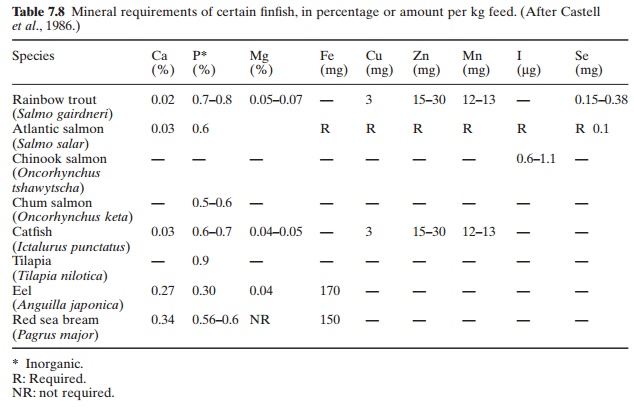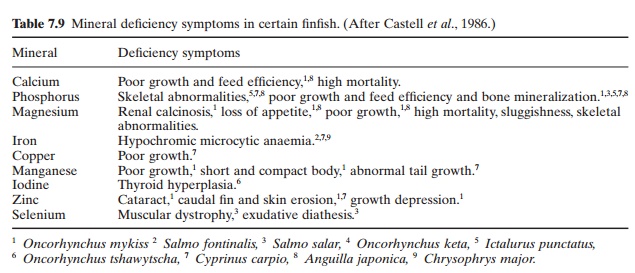Chapter: Aquaculture Principles and Practices: Nutrition and Feeds
Minerals - Aquaculture: Energy requirements and sources
Minerals
Minerals are required by all animals, either in their elemental form or
incorporated into specific compounds, for various biological functions such as
the formation of skeletal tissue, respiration, digestion and osmoregulation. Of
the 26 naturally occurring essential elements described for animals, only nine
have been shown to be required by finfish. Very little is known of the mineral
requirements of crus-taceans and molluscs. One of the main difficulties in
determining the quantitative mineral requirements of aquatic animals is their
ability to absorb inorganic elements from their external environment in
addition to their diets.
Since water generally contains an abundance of minerals, supplementation
of diets may not be necessary, except in the case of those that are required in
relatively high concentrations, especially in fresh-water fish. The available
information on the mineral requirements of fish is summarized in Table 7.8 and
information on deficiency symptoms in Table 7.9.

Calcium and phosphorus are closely related in metabolism, especially in
bone formation and the maintenance of acid-base equilibrium. While fish can
obtain calcium from food and also from the environment through gills and fins
in fresh water, phosphorus has to come mainly from food, as both fresh and salt
waters are generally deficient in phosphates. Almost the entire store of
calcium (99 per cent) and most of the phosphorus (80 per cent) in the body of
fish are in the bones, teeth and scales.

The remaining small portions are widely distributed throughout the
organs and tissues. Calcium is present in body fluids in non-diffusible form
bound to protein and in a diffusible fraction largely as phosphate and
bicarbonate compounds. It is this diffusible fraction that is of significance
in calcium phosphorus nutrition (Chow and Schell, 1980). Ionized calcium in the
extracellular fluids and in the circulatory system participates in muscle
activity and osmoregulation. Phosphorus combinations with proteins, lipids,
sugars, nucleic acids and other compounds are vital exchange currencies in life
processes, and are distributed throughout the organs and tissues.
Among the feed ingredients in common use, fish meal is rich in both calcium and phosphorus. However, feedstuffs of plant origin usually lack calcium, and
phosphorus, though abun-dant, occurs predominantly in the form of phytin or
phytic acid, which are generally not readily absorbed.
Magnesium is closely associated with calcium and phosphorus in
distribution and metabolic activities. While the bulk of the magnesium is stored
in the skeleton, the rest (40 per cent) is distributed throughout the organs
and muscle tissues and extracellular fluids. This fraction plays a vital role
in enzyme co-factors and as an important structural component of cell
membranes.
Among the trace elements of importance in fish nutrition, mention has to
be made of cobalt.Studies made in the USSR seem to indicate that addition of
cobalt chloride and/or cobalt nitrate to the feed, or the addition of cobalt
chloride to the water of fish ponds, enhances growth and haemoglobin formation
in common carp. Cobalt probably satisfies the requirement of bacteria that
synthesize vitamin B12, which the fish can utilize.
As mentioned earlier, there is very limited information available on
mineral requirements and deficiency symptoms in crustaceans and molluscs. It
was reported that the best growth of Penaeus
japonicus was obtained with diets containing 1.04 per cent phosphorus and
1.24 per cent calcium (Kitabayashi et al.,
1971). Other research (Deshimaru and Yone, 1978) showed that 2 per cent
phosphorus, 1 per cent potassium and 0.2 per cent trace element supplementation
in a purified diet are essential for maximum growth of this species and that
calcium, magnesium and iron supplementation are not essential. The best growth
and survival of the American lobster (Homarus
americanus) was achieved with a diet containing a Ca/P ratio of 0.51 (0.56
per cent calcium and 1.1 per cent phosphorus) (Gallagher et al., 1978).
Related Topics